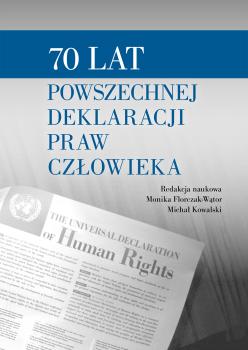70 lat Powszechnej Deklaracji Praw Człowieka
Słowa kluczowe:
Universal Declaration of Human RightsStreszczenie
70 YEARS OF THE UNIVERSAL DECLARATION OF HUMAN RIGHTS
The Universal Declaration of Human Rights has symbolic significance. After the experience of World War II with its „barbarous acts which have outraged the conscience of mankind”, the international community needed a symbol that firstly was an expression of opposition to such a devastating trampling of human dignity, and secondly it was an expression of hope for the restoration of „faith in fundamental human rights, in the dignity and worth of the human person and in the equal rights of men and women”. Adopted on December 10, 1948, the declaration has become such a symbol.
Today, 70 years after its adoption, the Universal Declaration of Human Rights is a symbol of the protection of human rights. It is, however, characteristic that the more attempts are made to depart from the symbolic nature of the Declaration, the clearer its ambiguous character becomes, both in the philosophical and axiological, as well as in the strictly legal dimension. This declaration still inspires asking a number of questions about the legal nature of contemporary human rights obligations, their genesis and axiological foundations, and finally, about the current shape of mechanisms for the protection of human rights which are on the one hand so sophisticated, and on the other – still so helpless against violations of fundamental human rights in modern world. The universality of these challenges makes the subsequent anniversaries of the adoption of the Declaration an opportunity for tackling these challenges again in academic debate.
This work consists of three parts. The first is of introductory character and contains texts devoted to the axiological and legal nature of the Declaration from today’s perspective. The second part contains studies dealing with six specific issues embedded in the catalogue of rights and freedoms contained in the Declaration. All of them have been undertaken in the context of contemporary challenges and allow to present today’s meaning and role of the Declaration in the jungle of international law mechanisms for the protection of human rights. Finally, the third part of this work contains four texts presenting the Declaration from the perspective of national law, in particular Polish law.
Rozdziały
-
TABLE OF CONTENTS
-
WSTĘP
-
CZĘŚĆ I
-
Uniwersalizm Powszechnej Deklaracji Praw Człowieka: krótka historia pewnego trudnego kompromisu
-
Współczesne znaczenie Powszechnej Deklaracji Praw Człowieka w międzynarodowym systemie ochrony praw człowieka
-
Powszechna Deklaracja Praw Czowieka jako akt prawny w obszarze prawa międzynarodowego
-
CZĘŚĆ II
-
Powszechna Deklaracja Praw Człowieka – niespełniona nadzieja mniejszości narodowych
-
Znaczenie art. 14 Powszechnej Deklaracji Praw Człowieka dla międzynarodowego prawa uchodźczego
-
Prawo do kultury i jego współczesne zagrożenia
-
Prawo do sądu jako prawo człowieka – rozważania na tle Powszechnej Deklaracji Praw Człowieka, Europejskiej Konwencji Praw Człowieka oraz Konstytucji Rzeczypospolitej Polskiej
-
Czy tylko narodzeni mają prawo do życia? Twórcy Powszechnej Deklaracji Praw Człowieka a prawa nasciturusa
-
Redakcja artykułu 18 Powszechnej Deklaracji Praw Człowieka i jej wpływ na kształt standardu wolności religijnej na przykładzie systemu Europejskiej Konwencji Praw Człowieka
-
CZĘŚĆ III
-
Powszechna Deklaracja Praw Człowieka jako akt prawny w obszarze prawa krajowego – uwagi o różnych zobowiązaniach międzynarodowych państwa
-
Wpływ Powszechnej Deklaracji Praw Człowieka na wykładnię i stosowanie prawa przez organy administrujące i sądy administracyjne
-
Wpływ Powszechnej Deklaracji Praw Człowieka na wykładnię i stosowanie prawa przez sądy karne
-
Rekomendacje w zakresie prawa do prywatności wydane przez Komitet Praw Człowieka i ich realizacja w Polsce
Downloads
Bibliografia





